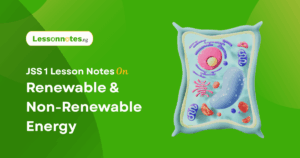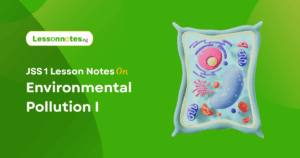Energy JSS1 Basic Science Lesson Note
Download Lesson Note
Lesson Notes
Topic: Energy
Meaning of Energy
Energy is defined as the ability or capacity to do work.
The unit of energy is Joules (J).
Sources of Energy
There are two main sources of energy: natural and artificial sources.
i. Natural Sources of Energy
- Sun
b. Food
c. Natural gas
d. Coal
e. Wind
f. Crude oil
g. Wood
h. Water
ii. Artificial Sources of Energy
- Batteries
b. Electrical generators
c. Petroleum products (e.g., diesel, kerosene, etc.)
Forms of Energy
- Light energy
- Sound energy
- Heat energy
- Chemical energy
- Electrical energy
- Mechanical energy (Potential and Kinetic energy)
Transformation of Energy
Energy can be converted or transformed from one form to another.
This is governed by the Law of Conservation of Energy, which states that:
Energy can neither be created nor destroyed, but it can be converted from one form to another.
Examples of Energy Conversion
- Electrical energy → Heat energy — Pressing iron, boiling ring, etc.
b. Electrical energy → Light energy — Bulb, television, etc.
c. Chemical energy → Electrical energy — Battery, etc.
d. Electrical energy → Kinetic energy — Fan, etc.
e. Electrical energy → Sound energy — Electric bell, telephone earpiece, etc.
f. Mechanical energy → Light energy — Bicycle dynamo
g. Sound energy → Electrical energy → Sound energy — Telephone
Uses of Energy
Energy is used in our daily activities such as:
a. Walking
b. Cooking
c. Playing
d. Operating appliances
e. Running
f. Household work
Classwork
- Define energy.
- Mention five (5) forms of energy.















